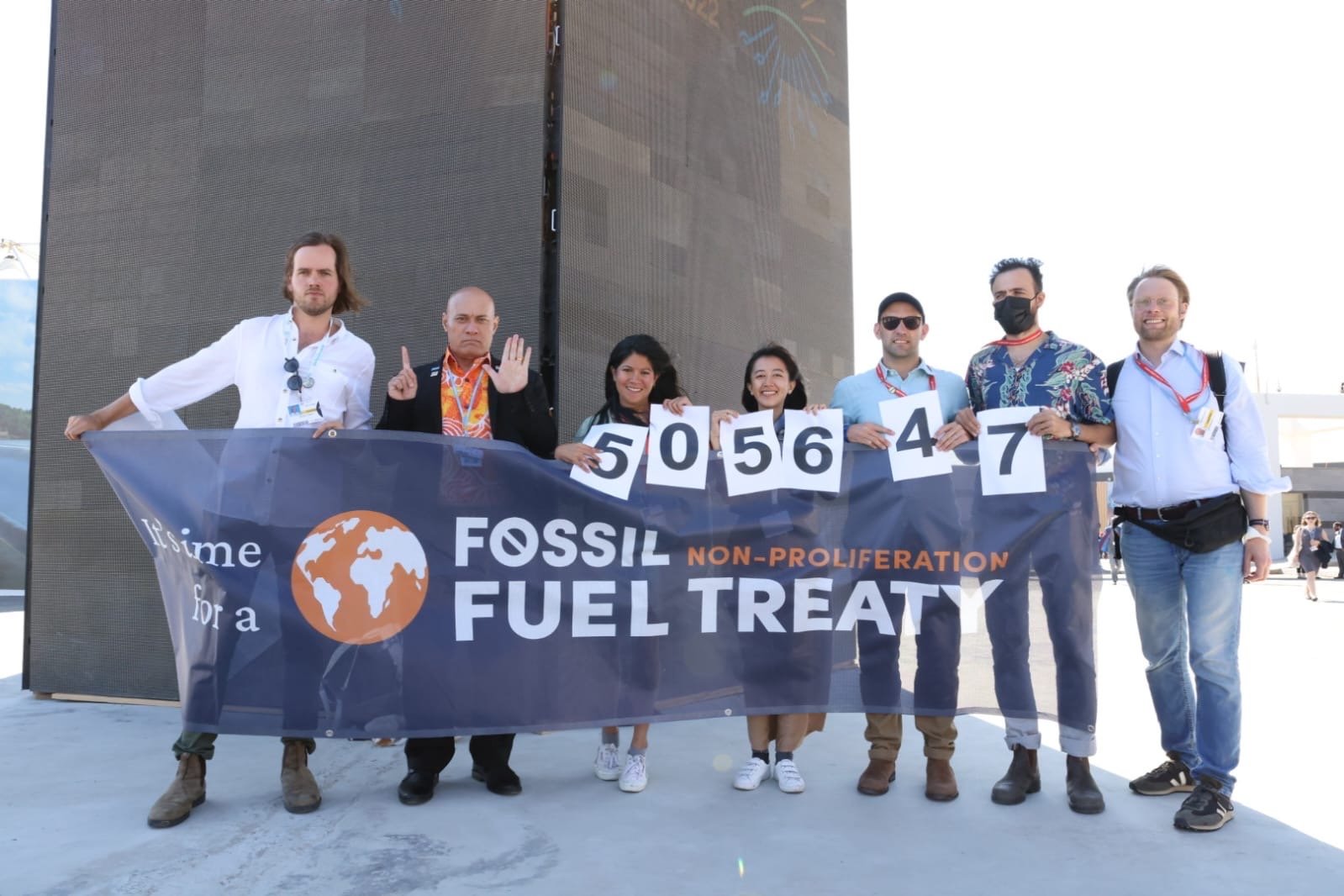Shortcomings of COP27 strengthen the case for a Fossil Fuel Treaty
A Ukrainian youth delegate raises the call for a Fossil Fuel Non-Proliferation Treaty at the COP 27 climate strike in Sharm el Sheikh, Egypt. (Photo by Bianca Csenki.)
TL;DR: The 27th year of U.N. climate talks comes to a bittersweet conclusion with a cover text that addresses the consequences of climate change but fails to act on the cause. After an eventful two weeks in Sharm el Sheikh, Egypt, world leaders finally delivered on a loss & damage financing facility. This landmark decision was the result of a decades-long movement led primarily by the Global South demanding accountability from wealthy polluting nations to pay for the irreversible impacts of climate change on their homes. However, the negotiations ultimately ended in a missed opportunity for the Egyptian COP presidency to name the main drivers of the climate crisis: coal, oil, & gas, and, more importantly, to equitably phase them out.
The Fossil Fuel Non-Proliferation Treaty Initiative was in attendance with one clear goal in mind: to free the world from the grip of fossil fuels.
We recap the events of the past two weeks, and what this means for the fight to phase out all fossil fuels.All eyes were on Egypt as world leaders descended upon Sharm el Sheikh from November 6-18, 2022 for the annual U.N. climate change conference, COP 27. Two key issues took the stage at this year’s climate talks: loss & damage, and fossil fuels.
Although the first earned a cautious win, the latter lurched to a standstill with a year's worth of civil society campaigning and political progress being lost by not being reflected in the final text. In fact, the words, ‘fossil fuel’ failed to get more than a single mention in the cover text. This was a crushing defeat for those who witnessed how loudly this call was echoed around the conference walls, despite its absence within the negotiation rooms.
This could be attributed to the relentless efforts of the 636 fossil fuel lobbyists permitted a seat at the proverbial table. This whopping number is larger than the combined delegations of the 10 most vulnerable countries to climate change, and more than the Pacific Island nations’ delegations.
The Finance Minister of Tuvalu presents the global petition calling for a Fossil Fuel Non-Proliferation Treaty with over half a million signatures.
Still, COP 27 wasn’t all doom and gloom. The Fossil Fuel Non-Proliferation Treaty movement soared to new heights — sparking hope for an alternative mechanism to keep 1.5 alive.
The 2022 Conference of Parties served as an important avenue for the Fossil Fuel Non-Proliferation Treaty to build momentum for itself on the world stage. We kicked off our first week with a historic endorsement from Tuvalu, whose Prime Minister used their world address to proclaim their support. This made waves in mainstream media, with many major outlets picking up the story, including The Guardian, TIME, CNBC, The Independent, Associated Press, and more, ultimately resulting in over 1,000 articles mentioning the treaty by the end of the COP.
Several key endorsements were made public throughout the weeks — from the Amazonian city of Belem to U.S. Senator Ed Markey and Member of the European Parliament, Pierre Larrouturou. Tuvalu also launched an online global petition calling for a treaty to manage a just transition away from fossil fuels that garnered over half a million signatures.

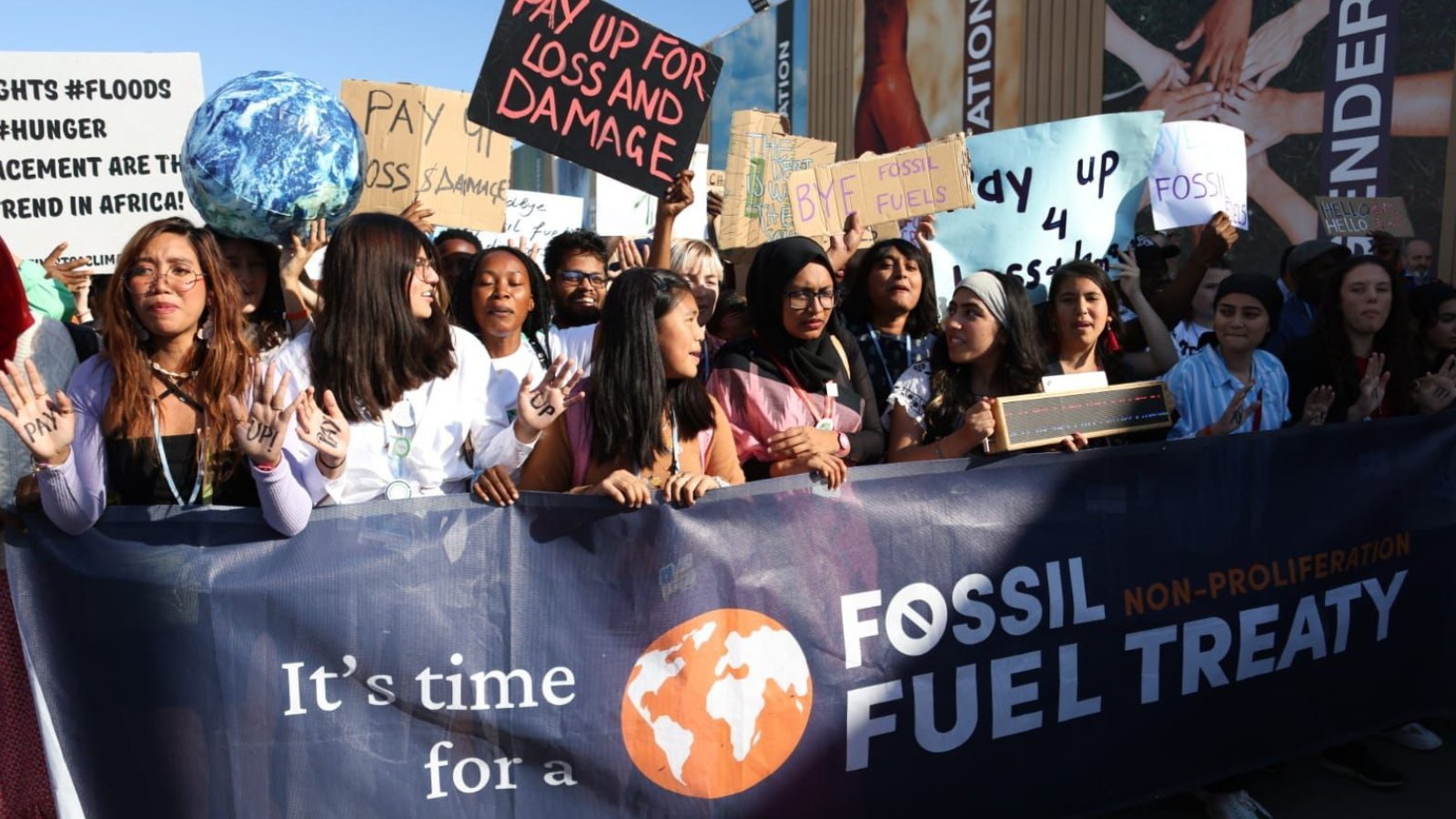
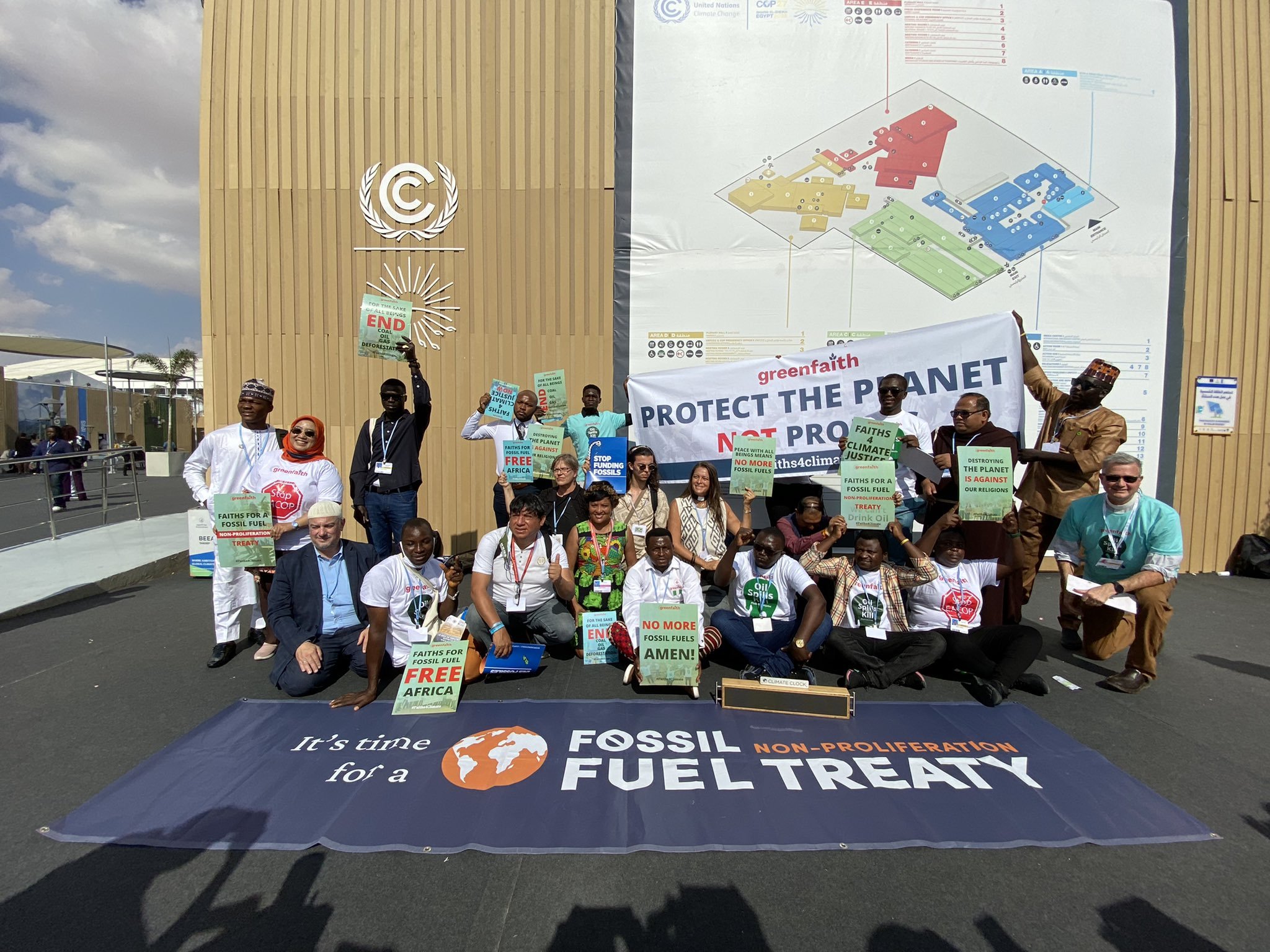
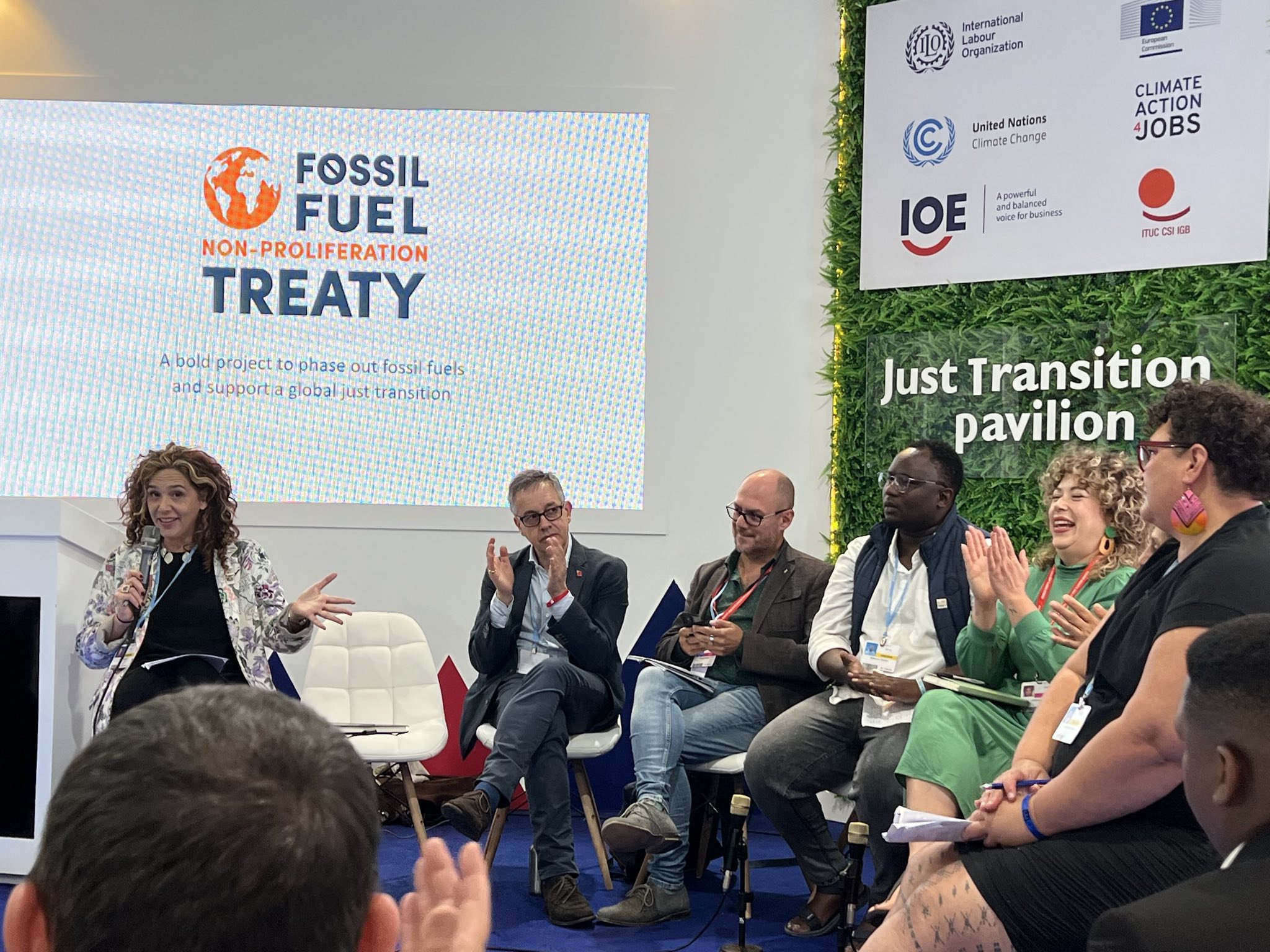
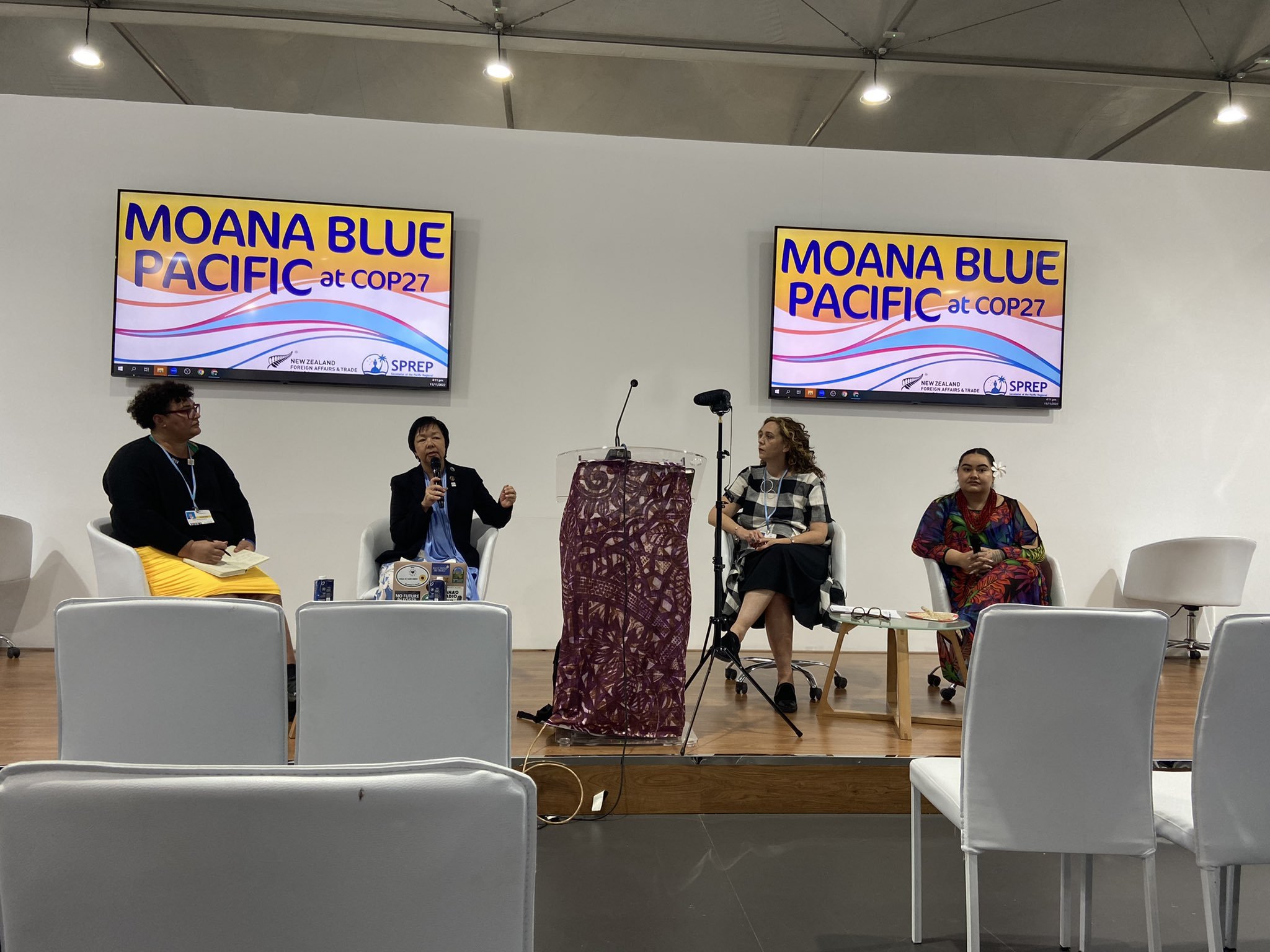
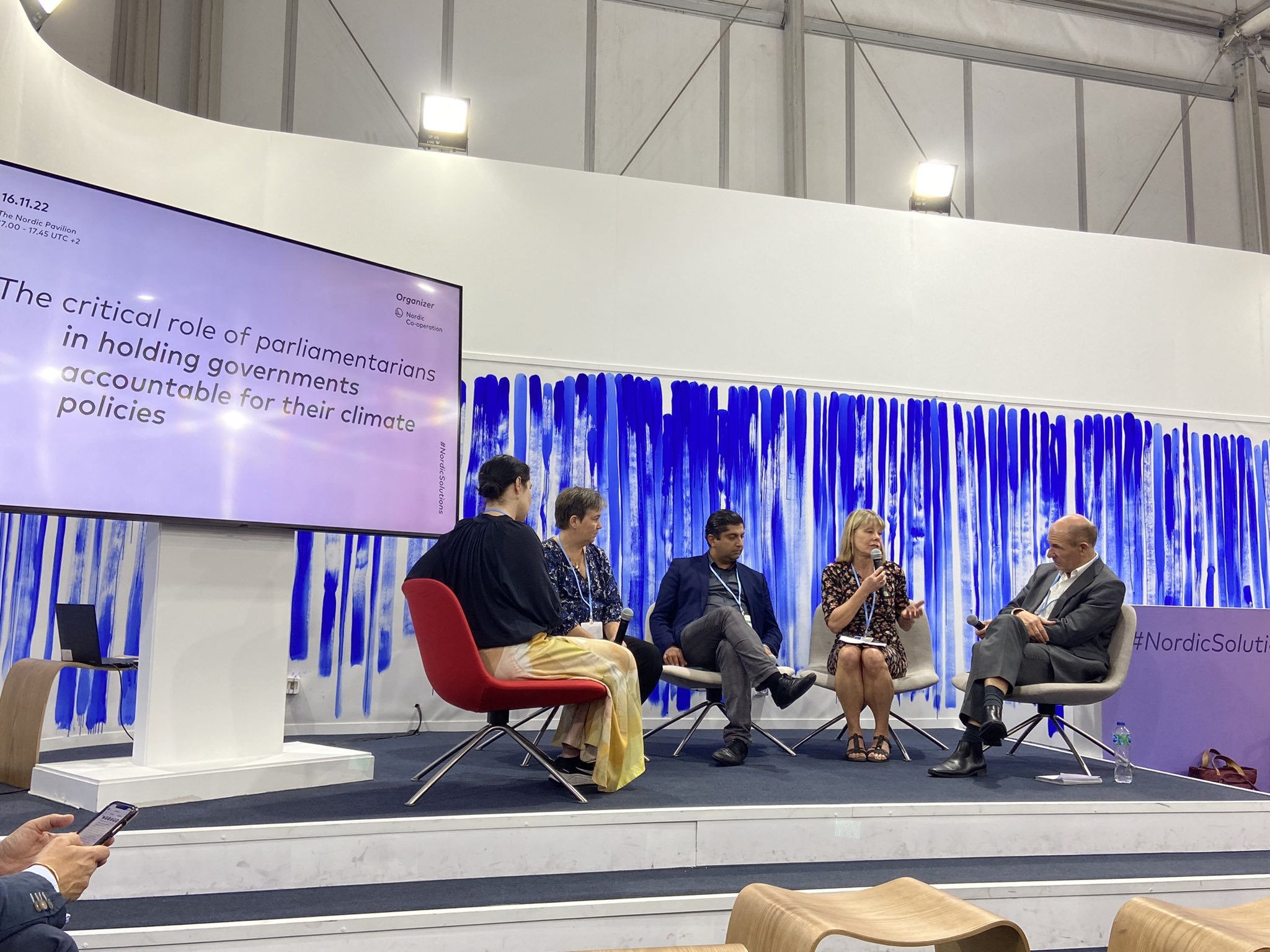
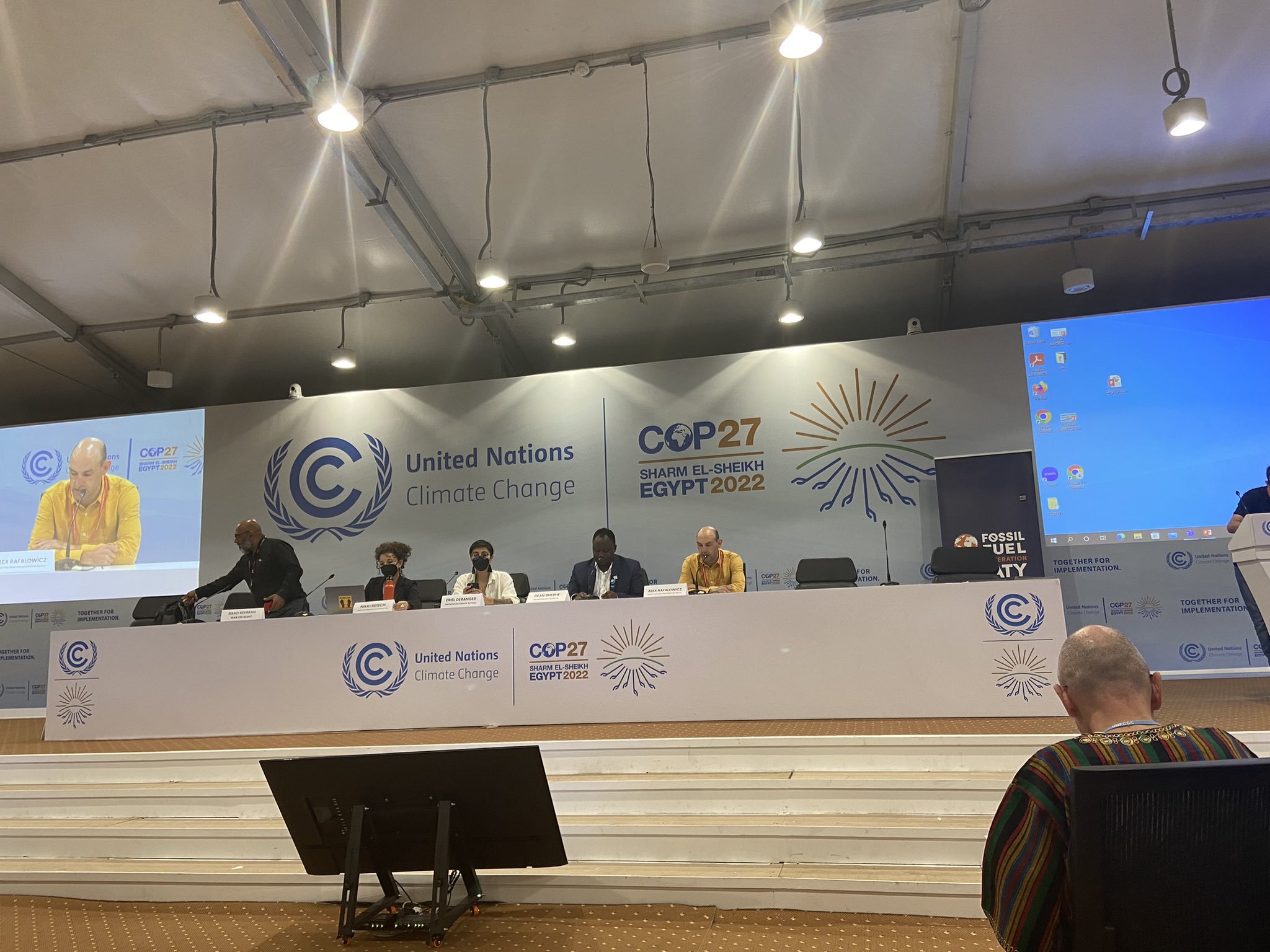
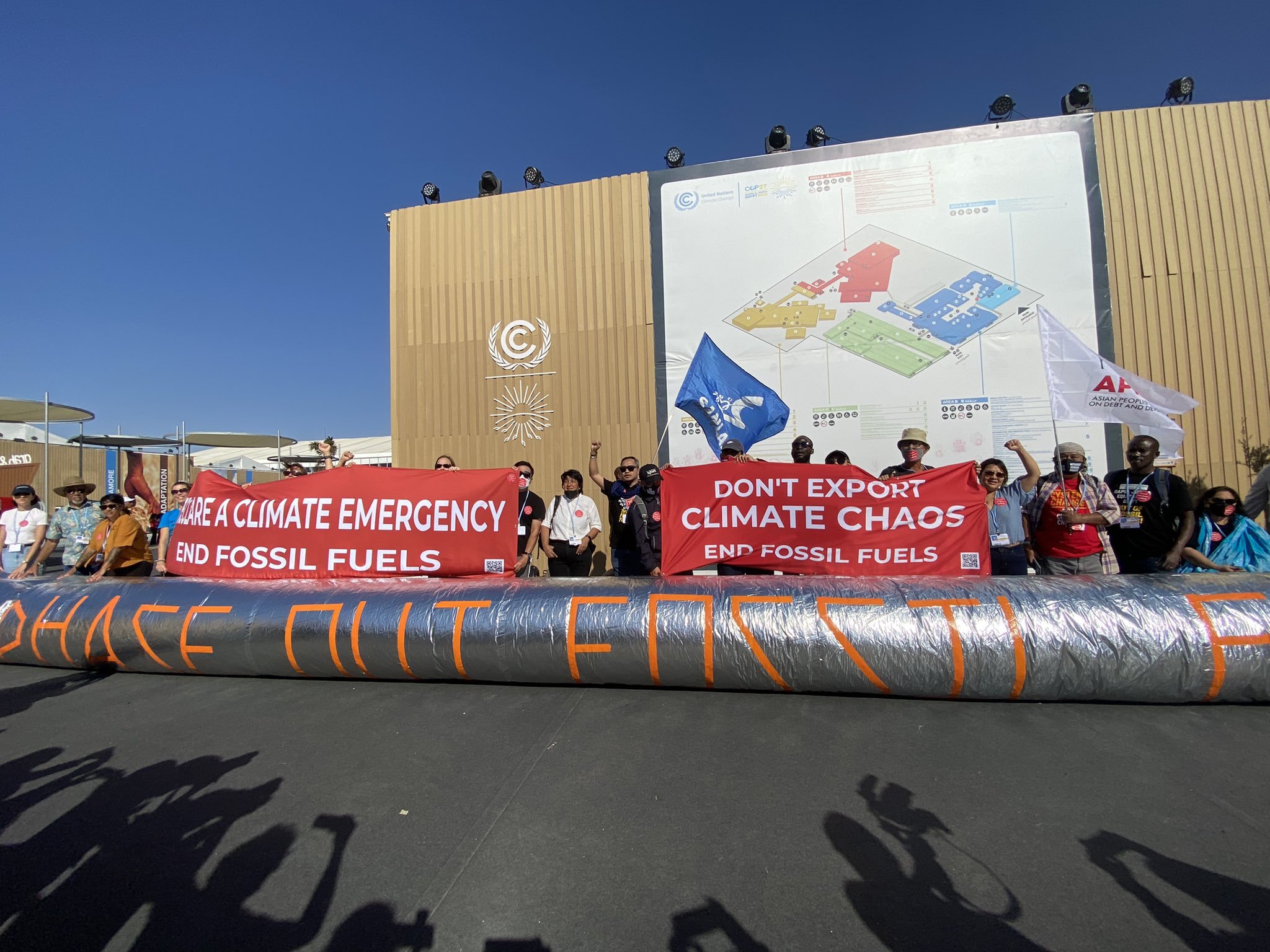
The team powered through a fully booked calendar From protest actions to public dialogues and press conferences to keep the conversation on fossil fuels alive. Our first week began with a public forum on international cooperation for a fair fossil fuel phaseout to discuss the suitability of multilateral frameworks for a just transition, and the role of states and other public entities in the global governance of fossil fuel supply. Then, with the Global Gas and Oil Network, we brought together a network of advocates and like-minded organizations to celebrate the Fossil Fuel Phaseout Fest.
One event highlight was the Treaty Talanoa, a public dialogue composed of women Pacific leaders and champions mapping out the path towards the phaseout of fossil fuels. There, we premiered three videos featuring Pacific Treaty champions from Fiji, Tuvalu and Samoa who drove home the message about showing real leadership in the face of the climate crisis.
We also contributed to the on-ground launch of two timely publications:
The Don’t Gas Africa campaign released “The Fossil Fuelled Fallacy”, a report deconstructing arguments deployed by the gas industry to justify a "dash for gas" in Africa; and
The Civil Society Equity Review published its 2022 report outlining international cooperation as the key to managing a global just transition.
New states and countries signed onto the Beyond Oil and Gas Alliance on its first anniversary, with Tuvalu going further to reiterate their call for the Fossil Fuel Non-Proliferation Treaty in their speech while announcing their intention to join.
One of the most action-packed segments of the second week was #PhaseOutFossils Day to amplify the call to keep gas, coal & oil in the ground. This demand was echoed throughout a series of protests from health practitioners, faith leaders, Don’t Gas Africa campaigners, activists from the Global South, and many more.
We then presented the Global Registry of Fossil Fuels developed by Carbon Tracker at a panel emphasizing the importance of holding policymakers accountable to experts for their emissions. Capping off a long day was the side event entitled, The F Words: What to do about Fossil Fuels in partnership with Center for International Environmental Law and War on Want. Speakers weighed in on the just transition from a justice and equity lens, sharing stories of advocating for free, prior & informed consent for indigenous peoples, debunking false solutions in Africa, and even how plastic pollution and fossil fuels are deeply intertwined.
Screenshot from the Sharm el-Sheikh Implementation Plan highlighting the ‘weasel words’ used on sections pertaining to energy and the just transition.
What does the cover text tell us? Where do we go from here?At the final press conference organized by the Fossil Fuel Non-Proliferation Treaty together with the Global Gas & Oil Network, we invited a powerhouse panel of all-women speakers to discuss the negotiations and how to proceed beyond the climate talks.
Nikki Reisch of CIEL spelled out our demands for the cover text: “We need an unqualified commitment to an equitable phase-out of all fossil fuels without language that provides loopholes for new investment in fossil fuel supply projects. There's no such thing as clean fossil fuels. The only clean oil and gas and coal are the coal, oil, and gas we leave in the ground.”
Nafi Chinery of the Natural Resource Governance Institute presented their findings on the fossil fuel economy: “Our research has established that there is no economic justification for continuous investment in fossil fuel and that countries that are dependent on fossil fuel risk disrupting their economies and the lives and livelihoods of people who live in this country.”
Tzeporah Berman of the Fossil Fuel Non-Proliferation Treaty traced the dots to the loss & damage talks: “Wealthy countries are dragging their feet on loss and damage. Let me make the connection for you: More fossil fuels equals more loss and damage. We call on the world's governments to pick a side — people or polluters?”
Most notable were their points zeroing in on the various ‘weasel words’ used in the cover text:
‘Clean technology’ and ‘energy diversification’ are code for carbon capture, blue hydrogen, and other false solutions.
Instead of phasing out coal, the text emphasized the ‘phasedown of unabated coal power.’ There is no definition of unabated in the U.N. policy making.
In the 13 years since ‘inefficient fossil fuel subsidies’ were first used at the G20 in 2009, there have been no criteria set for what would make a fossil fuel subsidy efficient.
At the last minute, ‘low emissions’ was included in addition to renewable energy being the best solution to the crisis, creating a loophole for petrostates and the fossil fuel industry.
Ayshka Najib of Fridays for Future concluded the event with a powerful message: “As the global youth, we call for climate investments to strengthen the transition to using renewable energy, and championing clean technology, climate adaptation, and resilience. The stolen spots by the fossil fuel industry are our stolen realities and our stolen futures. Polluters out of COP now!”
The Fossil Fuel Non-Proliferation Treaty Network culminates their annual 2022 Strategy Workshop with a group picture by the Red Sea.
The United Arab Emirates is gearing up to host COP 28. This announcement has racked up skepticism about the chances of a better outcome in the next year given the petrostate’s notorious dependence on gas. With the trajectory of fossil fuel expansion showing no signs of slowing down, many believe we are well beyond any chance of keeping to the 1.5 global warming limit.
But the tide is turning.The loss and damage fund is proof that decades of grit and sacrifice can reap a hard-earned reward. This year, over 80 countries, including the United States, Norway, Australia, and Canada, supported the phaseout or phase down of all fossil fuels. Whether or not governments can walk their big talk is a battle for another day, but this was a surprising yet welcome development in the fight for its inclusion in the text.
Most excitingly, we witnessed people from every sector calling for a Fossil Fuel Non-Proliferation Treaty — from youth activists with makeshift banners at climate strikes to world leaders delivering high-level endorsements on a global stage. COP 27 exposed a system beyond simple repair. After almost three decades of talking, it is clear that we cannot rely on the UNFCCC process alone to solve the climate crisis.
Still, hope persists because power does not exist between the hammer and gavel of negotiation rooms. It lives and breathes in the raised fists of youth activists, indigenous leaders, civil society workers, unions, and advocates of frontline communities most vulnerable to the climate crisis — standing up against a broken system, and saying ‘enough is enough.’
Ours is the true power that will pave the way for the inevitable end of the fossil fuel era, and the beginning of a just and equitable future for all peoples.

